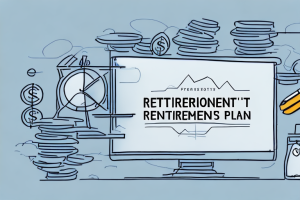Retirement planning is a crucial aspect of securing your financial future. It involves careful consideration of various factors, including your current financial situation, retirement goals, and the lifestyle you envision for your golden years. With an increasing life expectancy and rising costs of living, it’s important to evaluate whether retiring at the age of 70 with $300,000 is a feasible option.
The Importance of Retirement Planning
Retirement planning is essential to ensure a comfortable and stress-free retirement. It allows you to estimate the amount of money you will need to cover your expenses when you are no longer earning a regular income. A well-thought-out retirement plan takes into account factors such as inflation, healthcare costs, and unexpected expenses that may arise during your retirement years.
Furthermore, retirement planning provides you with the opportunity to set financial goals and create a roadmap to achieve them. By carefully considering your current financial situation, future income sources, and desired lifestyle, you can develop a plan that maximizes your savings and investments. This can help you build a substantial nest egg that will support you throughout your retirement.
Understanding the Costs of Retirement
Before deciding to retire at the age of 70 with $300,000, it is important to have a clear understanding of the costs associated with retirement. These costs can include housing, healthcare, transportation, groceries, entertainment, and other day-to-day expenses. By carefully assessing your current spending habits and considering potential changes in your lifestyle after retirement, you can better estimate the funds necessary to maintain your desired standard of living.
One important cost to consider in retirement is healthcare. As you age, healthcare expenses tend to increase, and it is crucial to have a plan in place to cover these costs. This may include budgeting for health insurance premiums, deductibles, copayments, and prescription medications. Additionally, it is wise to factor in the potential need for long-term care, such as nursing home or home healthcare services.
Another significant expense to account for is housing. Depending on your preferences and location, housing costs can vary greatly in retirement. This may include mortgage or rent payments, property taxes, homeowners association fees, and maintenance costs. It is essential to evaluate your housing needs and determine if downsizing or relocating to a more affordable area is a viable option.
Assessing Your Financial Situation
One of the first steps in retirement planning is assessing your current financial situation. This involves taking stock of your assets, including savings, investments, real estate, and any other sources of income you may have. It is crucial to have a comprehensive understanding of your financial standing to determine if retiring at 70 with $300,000 is feasible for you.
Once you have gathered all the necessary information about your assets and income, the next step is to evaluate your expenses. This includes analyzing your monthly bills, such as mortgage or rent payments, utilities, insurance, and any other recurring expenses. It is important to have a clear picture of your financial obligations to determine how much you can allocate towards retirement savings.
In addition to assessing your current financial situation, it is also essential to consider your future financial goals. This involves thinking about the lifestyle you envision for your retirement years and estimating the expenses associated with it. Factors to consider may include travel plans, healthcare costs, hobbies, and any other activities or expenses you anticipate in retirement. By understanding your future financial goals, you can better determine if retiring at 70 with $300,000 will provide the financial security you desire.
Evaluating Your Retirement Goals and Lifestyle
Retirement offers an opportunity to enjoy the fruits of your labor and pursue your passions. Before retiring, it is important to evaluate your retirement goals and lifestyle aspirations. Consider factors such as travel, hobbies, and leisure activities that you would like to pursue during your retirement years. By envisioning your ideal retirement lifestyle, you can better estimate the financial resources required to support it.
One important aspect to consider when evaluating your retirement goals and lifestyle is your health and wellness. As you age, it becomes crucial to prioritize your physical and mental well-being. Think about the activities and habits that will contribute to a healthy and fulfilling retirement, such as regular exercise, a balanced diet, and engaging in activities that stimulate your mind.
Another factor to take into account is your social life and relationships. Retirement can bring about changes in your social circle, as you may no longer have the same daily interactions with colleagues and coworkers. It is important to think about how you will maintain and cultivate meaningful relationships during your retirement years. This could involve joining clubs or organizations, volunteering, or staying connected with family and friends.
Calculating the Retirement Income Needed
To determine if retiring at 70 with $300,000 is viable, you need to calculate the income you will require during your retirement years. This involves assessing your estimated expenses and factoring in any additional income from sources such as pensions, social security benefits, and other investments. It may be helpful to consult with a financial advisor to ensure your calculations are accurate and account for any potential fluctuations in income and expenses.
Exploring Different Retirement Saving Strategies
When considering retirement with a $300,000 nest egg, it is essential to explore different saving strategies to maximize your funds. These strategies may include contributing to retirement accounts such as 401(k)s or IRAs, taking advantage of employer matching contributions, and investing in diversified portfolios to potentially increase your returns. Additionally, considering options like catch-up contributions or reallocations can help accelerate your retirement savings.
Maximizing Social Security Benefits for Retirement
Maximizing your social security benefits can play a crucial role in ensuring a comfortable retirement. By delaying claiming your benefits until full retirement age or even beyond, you can receive higher monthly payments. Understanding the nuances of social security, such as spousal benefits and survivor benefits, can help you make informed decisions about when and how to claim your benefits.
The Role of Investments in Building Retirement Savings
Investments can be an effective way to grow your retirement savings. By diversifying your investment portfolio and considering options such as stocks, bonds, mutual funds, or real estate, you can potentially increase the value of your investments over time. However, it is important to balance risk and reward and consult with investment professionals to ensure your investment strategy aligns with your risk tolerance and long-term goals.
Creating a Realistic Budget for Retirement Life
A realistic budget is an essential component of successful retirement planning. It helps you understand your income needs, prioritize your expenses, and make necessary adjustments. Start by assessing your essential expenses, such as housing and healthcare, and budgeting for discretionary spending on travel, leisure activities, and hobbies. Regularly reviewing and adjusting your budget is crucial to ensure it aligns with changes in your financial circumstances.
Strategies to Boost Your Retirement Savings
If retiring with $300,000 seems challenging, there are several strategies you can employ to boost your retirement savings. These may include increasing your contribution to retirement accounts, reducing discretionary spending, taking advantage of employer-sponsored retirement plans, and minimizing unnecessary fees. Additionally, exploring opportunities for additional income, such as part-time work or freelance projects, can help accelerate your savings.
The Power of Compound Interest in Retirement Planning
Compound interest can be a powerful tool when planning for retirement. By starting to save early and consistently contributing to your retirement accounts, you can take advantage of the compounding effect, where your investment gains generate additional earnings. This can significantly boost your retirement savings over time and help you achieve your financial goals.
How to Make the Most of a $300,000 Retirement Nest Egg
Retiring at 70 with a $300,000 nest egg requires careful financial management. To make the most of your savings, it is important to develop a sustainable withdrawal strategy. This involves considering factors such as inflation, market volatility, and expected longevity. By consulting with a financial advisor, you can create a personalized plan that optimizes your retirement income while preserving your savings for the long term.
Balancing Risk and Reward in Your Investment Portfolio
As you approach retirement, it is crucial to evaluate your risk tolerance and adjust your investment portfolio accordingly. While it may be tempting to seek higher returns, it is important to carefully balance risk and reward, considering your time horizon and income needs. Diversification and periodic rebalancing can help mitigate potential losses and ensure a smoother financial journey during retirement.
Considering Part-Time Work or Second Career Options
If retiring at 70 with $300,000 seems challenging, consider exploring part-time work or second career options. This can help supplement your retirement income and provide a sense of purpose and fulfillment. Many individuals find joy in pursuing new interests or turning a beloved hobby into a profitable venture. By leveraging your skills and experience, you can continue to generate income and make your retirement years financially comfortable.
How Long Will $300,000 Last in Retirement?
The duration that $300,000 will last in retirement depends on various factors, including your desired lifestyle, expenses, and investment performance. By carefully managing your expenses, maintaining a realistic budget, and implementing sound investment strategies, you can stretch your retirement funds further. Regular monitoring and adjustment of your financial plan can help ensure that your savings last throughout your retirement years.
Navigating Healthcare Costs in Retirement
Healthcare costs are one of the most significant expenses retirees face. It is important to consider health insurance options, such as Medicare, and evaluate supplemental coverage to minimize out-of-pocket expenses. Additionally, maintaining a healthy lifestyle and implementing preventive measures can help reduce healthcare costs in the long run. By factoring in healthcare expenses, you can better estimate the financial resources required for a secure retirement.
Tips for Downsizing and Cutting Expenses in Retirement
Downsizing and cutting expenses are effective ways to stretch your retirement savings. By evaluating your housing needs and considering options such as downsizing to a smaller home or relocating to a less expensive area, you can significantly reduce your housing costs. Additionally, reviewing your monthly expenses and identifying areas where you can cut back can help free up funds for other aspects of your retirement lifestyle.
Exploring Alternative Housing Options for Retirees
Retirement often brings opportunities to explore alternative housing options. From downsizing to retirement communities, independent living, or even living abroad, it is important to consider the advantages and disadvantages of various housing arrangements. Factors such as location, cost, social aspects, and healthcare services should be taken into account when determining the most suitable housing option for your retirement needs.
Long-Term Care Insurance: Do You Need It?
Long-term care insurance is an important consideration for retirees. It provides coverage for services such as nursing home care, assisted living, or home healthcare, which can be costly as you age. Assessing your family history, health status, and financial situation can help determine if long-term care insurance is necessary for you. Consulting with an insurance professional can provide insights into available options and help you make an informed decision.
Retiring at 70 with $300,000 requires careful planning and consideration of various financial factors. By evaluating your current financial situation, assessing your retirement goals, exploring different saving strategies, and making informed decisions about investments and expenses, you can work towards achieving a secure and comfortable retirement. It is always advisable to seek guidance from financial professionals to ensure you are making the best choices for your individual circumstances. With a comprehensive approach to retirement planning, you can increase the likelihood of enjoying your golden years with peace of mind.



